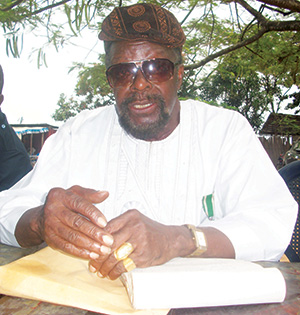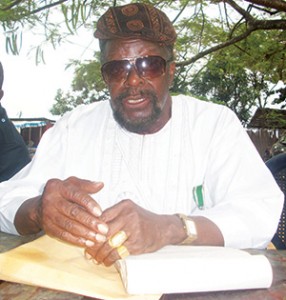Lari Williams was invited home as a musical poet and actor to represent the London zone at the second World Black and African Festival of Arts and Culture (FESTAC 77). He never went back. In this interview with Assistant Life Editor, TERH AGBEDEH, during the 80th birthday of lawyer and playwright, Fred Agbeyegbe, the man who insinuates that he is ‘the father of Nollywood’ talks about the decision not to go back and issues bordering on arts and culture.
What have you to say to Fred Agbeyegbe as he celebrates his 80th birthday?
I should tell him ‘thank you’ for keeping us going. Like the Americans say, keep on keeping on. He is a dear friend and a senior colleague, and I have always enjoyed his work. So I congratulate him on his 80th birthday.
Isn’t it ironic that the National Theatre that you and your colleagues have fought very much for is where he is celebrating his 80th birthday; does it worry you that there is still talk about selling it off many years after the fight?
They are still talking about selling this place. What they are trying to say, if I understand it clearly, is that the place is not making money. But that, to me, is not the right thing to say. This place should be celebrated. This place should be a showcase of our artistic creativity. This place should be a great monument for Nigeria where we showcased our works during FESTAC. I had lived in England for nearly 20 years before I was invited home for FESTAC. It was that much celebrated. All Africans in the Diaspora came home for FESTAC and we celebrated it here; opened this place for the first time. I have always performed other people’s plays, my plays and so on here. But now it is very sad to hear that anyone is talking of selling it. Selling for what? To whom?
Now they say it is the fallow land around it they want to sell, so that they can fix the theatre. But there are those who are saying if you can’t manage it now, how will you be able to do that after the land has been sold?
That is a good question. The land around it is supposed to feed the artistes; I mean the place with the expertise of the artistes. In that place where we call the Artistes’ Village, you have actors, dancers, sculptors, all sorts of artistes (and artists), and that is the place that should be kept alive. So for anybody to talk about selling it is criminal. It is sad that the government from time to time does not seem to pick the right person as a minister for arts. It is the ministry for arts that has had the most number of changes. It is like that musical game where people run around and they say stop; anybody that stops there they choose him.
It is that time again when they pick ministers, what kind of person would you tell the current administration to take as minister for arts?
That is what I am saying. They should look carefully and think because the foundation has been wrong. They had this place and the first general manager or director was a historian who knew nothing about theatre. It has moved on and on and the best person that has performed here was Col. Tunde Akogun, who happened to be a soldier. He was the only person with whom I worked to open what they call Open Theatre. That is when we started coming in with plays. Fred Agbeyegbe’s Ajoh was one of the companies that brought plays here. My company, Lari Williams Playhouse, started it. I put the first play on and called it ‘Home to Ajegunle’, which I wrote. And I came back with another play called ‘Awero’. I was the first person to bring Baba Ajanaku onto this stage here. We were celebrating this place, we were keeping it alive.
Like Agbeyegbe, you also returned from the UK, do you rue the day that you came back?
I didn’t come to stay, but as it happened, as an only son to my family, there was a little sentiment on that side; so I had to stay, plus the fact that I wanted to be part of the build-up for this industry. And as it happened, I was the chairman of the committee in NANTAP (National Association of Nigerian Theatre Arts Practitioners) that named the guilds. Then I became the first president of the Actors’ Guild of Nigeria (AGN), which means I am the father of Nollywood, though I have not been part of it for quite some time. To me, it has become a tribal warfare. But I will leave that aside.
The AGN you talk about doesn’t even exist anymore because of in-fighting?
I don’t know because they swept me aside. They had a board of trustees and I have never known anything about it, and I have never been even invited. The only time I had an invitation was when I was to come and tell them congratulations on their 20th anniversary, Nollywood at 20.
You were talking about whether you rue your return to the country earlier in this interview.
No, I am happy that I stayed. I came back, I didn’t come to stay, but I am happy I stayed because this is what I have lived for. I trained in one of the best schools in the world, as they say out there; I went to Stratford. I trained at East 15 Acting School, Mountview Theatre School, and out there I was doing very well. I was the first Nigerian to put a play on at the Commonwealth Hall, the largest hall in London. I used people like Olu Jacobs, Taiwo Ajai-Lycett, Benita Enwonwu and today I saw one of my actresses, Miss Dacosta, she too, was in that play, which I called ‘Kolanut Junction’. And I am talking as far back as 1971.
You wrote this play?
I wrote the play and produced it in London. I was in school then. I was at Stratford.
Not so long ago, it emerged that the Ibinabo Fiberesima-led AGN, which is no more right now, provided you a two-bedroom accommodation in Lagos…
I don’t know who started that lie. Look, wait a minute: I don’t know who came to my office the other day. Why would anyone give me a house somewhere and I decide to stay in my office? Till now, I still live in the office. So it is a lie. I don’t know why they started that.
What happened is, they invited me once and said they had found me a place. I jumped in the van and we went there. I got there, only for the agent to tell me, ‘Ah, last night they paid for it; somebody paid for it’, and that they would get me another place. I didn’t get anything, then somebody phoned me and asked whether I would share a flat with Tunde Alabi. I said, look, I have a son who is just finishing law who stays with me, I don’t know how I would go and share a one-bedroom apartment with another man. Here at the Artistes’ Village, the man has his own office, I have mine. I put him up for a couple of years when I was lecturing in Calabar, but I came back and we all stayed there until he found a room for himself. Why would they say they gave me a place? I mean, I just couldn’t understand that.
If a young person came to you and said they wanted to do theatre, what would you tell them?
There is no profession that people don’t learn, no job. People should not just jump into any profession; they should study it. So too much of a jamboree; everybody is jumping in and becoming an actor. It is meaningless. This is what I tried to do when I wrote to the AGN to say that I would start giving people lessons, even if for free. Let’s have a kind of orientation. Let people know what it is all about. Not just anybody comes and registers and pays a certain amount then shows up: I have an AGN card. Nobody cared about that, nothing happened. About a year and half or so ago, I wrote to Ibinabo – she still must have the letter – to say look, I am going on a lecture tour. I wanted to start from Calabar, because I just left there at that time, to talk to the AGN chapters about professionalism in the industry. It is all documented, but I didn’t get any support; so I decided to do it on my own. But I still have not been able to do so. Meanwhile, I have been giving lessons to young people who come into my office here. I have a three-month course teaching them drama. I have registered the Academy of Dramatic Arts and Music (ADAM). I am teaching acting technique, which is what I have lectured in three different universities – acting technique, music. So I just keep going.












